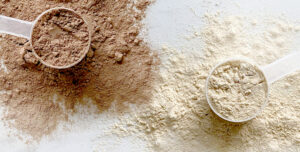National Diabetes Month is a time to spread awareness and resources to help people get diagnosed and manage diabetes as early and effectively as possible. This year’s theme is about building your health care team in order to best manage diabetes.
Every November, there are multiple organizations that raise awareness around diabetes from the National Institute of Diabetes and Digestive and Kidney Diseases (NIDDK), The American Diabetes Association (ADA), The International Diabetes Federation (IDF), and many more.
In the US, The ADA first established the inaugural National Diabetes Awareness Month in 1975, which was later recognized and proclaimed by US President Donald Reagan in 1981.
As a brand that believes that knowledge is power over the things that ail us—and that there are solutions and ways to improve some complex health issues like diabetes—we are pleased to spread the word on ways to prevent and better manage diabetes.
First, What is Diabetes?
Diabetes is a disease where your blood glucose, or blood sugar, is too high and your body either can’t produce enough of the hormone insulin—or use it efficiently—to help control blood sugar.
An estimated 37 million—one in every ten—Americans have diabetes. What’s even more staggering about that stat is that one in four of those 37 million don’t know they have diabetes yet—they are among the 8.5 million people that remain undiagnosed. If not managed over time, diabetes can threaten eyesight, kidneys, nerves, and may lead to some forms of cancer and heart disease.
It may sound grim but thankfully there’s actually a lot that can be done from early testing to making some key lifestyle changes to help prevent, treat, and even reverse some types of diabetes.
The 4 Types Of Diabetes To Know
- Type 1 Diabetes: Where a person’s body doesn’t produce insulin and therefore needs insulin therapy in order to manage their diabetes.
- Type 2 Diabetes: The most common form of the disease where the body makes insulin but the body can’t utilize it properly.
- Gestational Diabetes: Typically a temporary form of diabetes that arises in pregnancy, gestational diabetes affects approximately 6% to 9% of pregnant women who didn’t have diabetes before becoming pregnant.
- Prediabetes: A symptomless precursor to Type 2 diabetes, prediabetes means that you have elevated blood sugar levels but not yet high enough to be diagnosed with Type 2 diabetes. By finding out early, you can reverse the pattern through diet and exercise and never go on to develop Type 2 diabetes, which is why early testing is so important.
In all four types of diabetes, careful attention to lifestyle habits such as nutrition and diet is one of the best ways to manage the disease.
Insulin Is A Treatment Not a Cure
Last year marked the 100th year since Canadian scientist Sir Frederick Banting co-discovered insulin with Charles Best in 1921. While it’s been effective at helping to treat diabetes, it is not considered a cure. Many who rely on insulin to live a normal life also live with the anxiety of a potential overdose or underdose, which can have symptoms ranging from something as mild as lightheadedness to more severe symptoms such as seizures or even death.
Today, scientists are working diligently to find a cure and make insulin obsolete. One area of study that’s showing promise is a type of stem cell research that will bring pancreatic islet cells back from the dead and reverse diabetes.
How Can You—Or Someone You Love—Build A Health Care Team?
The first and most important thing to note here is that you—yes you!—are the most important member of your health care team. You have the power to monitor your health more closely than anyone else and record notes, symptoms, treatment details, and seek out further assistance as needed.
Talk to your primary care provider about your individual case and inquire as to whether you’d benefit from adding specialized health experts to your team. Many diabetics enlist a registered dietitian or nutritionist, a certified diabetes education, an eye doctor, podiatrist, or a mental health professional to help them better manage the disease.
5 More Ways To Manage Diabetes
- Know your ABCs and get them tested: Read up on the diabetes ABCs—your A1C, blood pressure, and cholesterol— and talk to your health care provider about healthy ranges for all three and how to best manage them. This will help reduce your chances of heart attack, stroke, or further complications with diabetes.
- Eat a nutrient-dense diet: What you eat has a big impact on regulating blood sugar levels, which is particularly important to those managing diabetes. It is recommended that diabetics eat plenty of non-starchy vegetables, whole grains (instead of refined), clean, lean proteins, healthy fats, and low-sugar fruits. Fried and sugary foods are best avoided.
- Move daily: Regular physical activity like walking, swimming, or resistance training plays a key role in keeping blood sugar levels in the optimal range for those with diabetes. The NIDDK recommends 30 minutes of activity daily—or most days of the week. If you’re new to exercise, be sure to talk to your health care provider before starting a new exercise routine.
- Manage your weight: If you currently have prediabetes or have a high chance of developing Type 2 diabetes because it runs in your family, it’s important to manage your weight. If you’re overweight, reducing your overall body weight by 5% to 7% may delay or even prevent you from developing diabetes.
- Take care of your mental health: Did you know that stress, anger, and anxiety can raise your blood sugar levels? The good news is there are many ways to manage stress and anxiety. Try practicing breathwork, yoga, walking in nature, spending time doing a hobby you enjoy, meditation, or listening to music.
You, too, can play a role in spreading awareness around diabetes and ways to manage it.
Here’s how:
- Share this article with someone who may appreciate the helpful tips.
- On November 14th, take part in World Diabetes Day—an international campaign represented by a blue circle logo to help raise awareness on a global scale—you can even share a blue circle selfie on social media to amplify the cause.
- Find out even more ways to get involved here. Every action has the power to make a difference!
*The links used in this article are being provided as a convenience and for informational purposes only; they do not constitute an endorsement or an approval by Iovate Health Sciences International Inc. or any of its affiliates (“Iovate”) of any of the products, services or opinions of the corporation or organization or individual. Iovate bears no responsibility for the accuracy, legality or content of the external site or for that of subsequent links. Contact the external site for answers to questions regarding its content.







